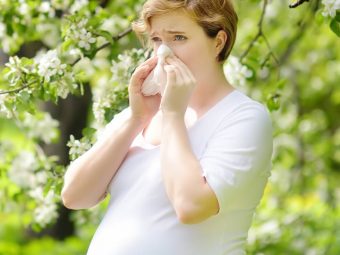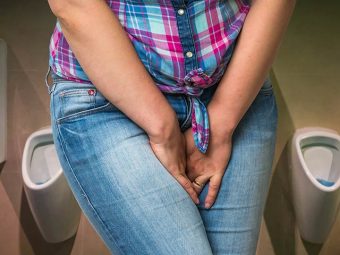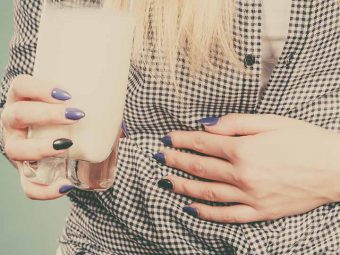Stomach Ulcers: 17 Home Remedies, Symptoms, And Diet Chart
Discover ways to temporarily alleviate your pain before seeking medical attention.

If you get stomach aches and nausea at random times or after meals when you eat certain foods, you may benefit from home remedies for stomach ulcers. Random pains in the stomach may be indicative of stomach ulcers, and it’s critical to treat these sores right away to avoid them becoming chronic and causing consequences.
Peptic ulcers and gastric ulcers are two terms for stomach ulcers. These are painful ulcers that appear on the stomach lining. They not only cause discomfort, but they also make eating unpleasant. They may cause problems asssociated with your stomach and small intestine.
Continue reading to learn more about stomach ulcers and natural remedies.
In This Article
How To Treat Peptic Ulcers Naturally
1. Baking Soda And Apple Cider Vinegar
Anecdotal evidence suggests that baking soda helps in restoring the pH of the stomach. Apple cider vinegar is also used in treating ulcers due to its pain-relieving properties (1). Hence, the combination of baking soda and ACV may help in treating stomach ulcers.
You Will Need
- 1 teaspoon of apple cider vinegar
- 1/2 teaspoon of baking soda
- 1 glass of warm water
- Honey
What You Have To Do
- Mix one teaspoon of apple cider vinegar and half a teaspoon of baking soda in a glass of warm water.
- Add some honey to this mixture and drink once the fizz settles down.
How Often You Should Do This
Do this once a day.
2. Honey
Honey contains an enzyme called glucose oxidase (2). This enzyme is known to produce hydrogen peroxide (3). This may help fight the bacteria responsible for causing peptic ulcers.
You Will Need
- 1 tablespoon of honey
- 1 glass of water
- A pinch of cinnamon powder
What You Have To Do
- Add a tablespoon of honey to a glass of warm water.
- Mix well and add a pinch of cinnamon to it.
- Drink the mixture.
How Often You Should Do This
Do this 2 times a day.
3. Garlic
Garlic contains a compound called allicin. This compound possesses powerful antimicrobial properties. These properties help combat Helicobacter pylori, which are known for triggering peptic ulcers (4).
You Will Need
2-3 cloves of raw garlic
What You Have To Do
- Add a few cloves of crushed raw garlic to salads and dishes.
- You can also chew on a few garlic cloves.
How Often You Should Do This
Do this on a daily basis.
4. Ginger
Ginger exhibits protective and preventive effects on stomach ulcers and reduces their severity (5), (6). Hence, ginger may help in treating symptoms that develop due to stomach ulcers.
You Will Need
- 1 teaspoon of grated ginger
- 1 cup of water
- Honey
What You Have To Do
- Add a teaspoon of grated ginger to a cup of water.
- Bring it to a boil in a saucepan.
- Simmer for 5 minutes and strain.
- After the tea cools down a little, add some honey to it and drink immediately.
How Often You Should Do This
Do this 3 times a day.
5. Turmeric
Turmeric contains a compound called curcumin, which exhibits powerful anti-inflammatory and antioxidant activities (7). This may help prevent and treat stomach ulcers.
You Will Need
- 1 teaspoon of turmeric powder
- 1 glass of warm water
- Honey (optional)
What You Have To Do
- Add a teaspoon of turmeric powder to a glass of warm water.
- Mix well and add some honey to it.
- Consume the mixture.
How Often You Should Do This
Do this 2-3 times a day.
6. Banana
Raw bananas contain compounds like phosphatidylcholine and pectin. These compounds strengthen the stomach mucosal resistance to ulcerogens (8). This may help in treating peptic ulcers and their symptoms.
You Will Need
1 ripe or unripe banana
What You Have To Do
- Consume a ripe banana.
- Unripe bananas can be cooked or consumed in its powdered form.
How Often You Should Do This
Have a banana 3 times a day.
7. Green Tea
Green tea contains a polyphenol called epigallocatechin gallate (EGCG) that exhibits anti-ulcer activities (9). Thus, green tea may help in accelerating the healing of the stomach ulcers.
You Will Need
- 1 teaspoon of green tea
- 1 cup of water
- Honey
What You Have To Do
- Add a teaspoon of green tea to a cup of steaming hot water.
- Steep for 5 minutes and strain.
- Add some honey to it.
- Drink it while it is warm.
How Often You Should Do This
Drink green tea 2 times a day.
8. Aloe Vera Juice
Aloe vera gel exhibits strong anti-inflammatory properties (10). This may help in speeding the healing of stomach ulcers.
You Will Need
1 cup of fresh aloe juice
What You Have To Do
Consume a cup of fresh aloe juice.
How Often You Should Do This
Drink this juice 1-2 times a day.
9. Cabbage
Cabbage is a rich source of an amino acid called glutamine. This compound helps in nourishing and repairing gastrointestinal lining, which is damaged by ulcers. It also contains an anti-peptic ulcer factor (vitamin U) that may accelerate the healing of peptic ulcers (11).
You Will Need
- ½ raw cabbage
- Blender
What You Have To Do
- Slice the cabbage into two halves.
- Cut one half of the cabbage into cubes and put them in a juicer.
- Extract the juice.
How Often You Should Do This
Do this once a day.
10. Cayenne Pepper
Cayenne pepper contains a compound called capsaicin. Capsaicin neutralizes the stomach acid and enhances the release of the stomach mucus (12). This may help in healing peptic ulcers.
You Will Need
- ½ teaspoon of powdered cayenne pepper
- 1 glass of warm water
- Honey
What You Have To Do
- Add half a teaspoon of powdered cayenne pepper to a glass of warm water.
- Mix well and add a little honey to it.
- Drink the mixture.
How Often You Should Do This
Do this 2 times a day.
11. Licorice
Scientific research shows that licorice possesses protective effects on ulcers and enhances the secretion of stomach mucus (13). This may help treat stomach ulcers.
You Will Need
- 1-2 teaspoons of licorice tea
- 1 cup of water
- Honey
What You Have To Do
- Add one to two teaspoons of licorice tea to a cup of water.
- Bring it to a boil in a saucepan and simmer for 5 minutes.
- Strain and allow the tea to cool a bit.
- Add a little honey and drink the tea.
How Often You Should Do This
Do this 2-3 times a day.
12. Vitamin E
Vitamin E exhibits anti-ulcer and cytoprotective effects. This is possibly because of the increased synthesis of prostaglandins and glutathione by vitamin E (14). Hence, vitamin E may help in minimizing the effect of stomach ulcers.
You Will Need
15-20 mg vitamin E
What You Have To Do
Have 15-20 mg of vitamin E daily. You can take supplements for this vitamin after consulting your doctor.
How Often You Should Do This
Do this on a daily basis.
13. Cranberry Juice
Cranberry juice contains compounds like proanthocyanidins that prevent Helicobacter pylori from adhering to the intestinal lining (15).
You Will Need
1 cup (or 250 ml) of cranberry juice
What You Have To Do
Consume a cup of unsweetened cranberry juice.
How Often You Should Do This
Do this 2 times a day.
14. Coconut
Coconut oil and coconut milk exhibit antiulcerogenic and cytoprotective effects (16). Both of these are beneficial for the reduction and management of stomach ulcers.
Note: Coconut milk is more effective than coconut water.
You Will Need
1 cup of coconut water
What You Have To Do
- Drink a cup of fresh coconut water.
- Alternatively, you can add coconut milk or freshly grated coconut to your dishes and salads.
How Often You Should Do This
Do this daily.
15. Fenugreek Seeds
Fenugreek seeds are anti-inflammatory and exhibit mucilaginous properties (17). This may help in restoring the mucus of the damaged intestinal lining, thereby helping treat stomach ulcers.
You Will Need
- 1-2 tablespoons of fenugreek seeds
- Water
What You Have To Do
- Boil one to two tablespoons of fenugreek seeds in a cup of water.
- Keep boiling until the quantity of water reduces to half the initial quantity.
- Strain and wait for it to cool a bit.
- Drink the fenugreek concoction.
How Often You Should Do This
Do this once a day.
16. Drumsticks (Moringa)
Drumstick leaves have healing and anti-inflammatory properties (18). This may help in reducing peptic ulcers and prevent further damage.
You Will Need
- 10 grams of drumstick leaves
- Water (as required)
- Yogurt (as required)
What You Have To Do
- Make a thick paste of the drumstick leaves using a little water.
- Add a little yogurt to it and consume it.
How Often You Should Do This
Do this every day.
17. Dandelion Tea
Dandelion possesses powerful anti-inflammatory properties (19). This may help in reducing the severity of stomach ulcers and also accelerates their healing.
You Will Need
- 1-2 teaspoons of dandelion tea
- 1 cup of hot water
- Honey
What You Have To Do
- Add one to two teaspoons of dandelion tea to a cup of steaming hot water.
- Steep for 5 to 10 minutes and strain.
- Add a little honey to the warm tea and drink immediately.
How Often You Should Do This
Do this 3 times a day.
The diet plays a major role in causing and combating peptic ulcers. Here’s a diet chart that includes the foods to consume and avoid to get rid of stomach ulcers.
Diet Chart For Stomach Ulcers
Foods To Eat
- Protein-rich foods, like white meat from chicken, turkey, or fish.
- Fatty fish, like salmon, sardines, and mackerel.
- Low-fat cheese, yogurt, and peanut butter.
- Fresh fruits and veggies, like broccoli, carrots, kale, red/green peppers, grapes, cabbage, apricots, and kiwi.
- Vitamin E-rich foods, like wheat germ, hazelnuts, sunflower oil, and soybean oil.
Foods To Avoid
- Alcohol
- Salted foods
- Processed or canned foods
- High-fat dairy products
- Too much of spices
- Caffeine
- Red meat
It is also important to follow a few basic tips and make some minor changes to your lifestyle for complete recovery from peptic ulcers.
Prevention Tips
- Limit your alcohol intake.
- Quit smoking.
- Limit the consumption of anti-inflammatory medications like aspirin and ibuprofen.
- Wash your hands at regular intervals to avoid infections that may trigger ulcers.
- Follow a well-balanced diet plan.
It is important to remember that individuals with stomach ulcers may feel aching hunger pangs between the navel and the breastbone that may sometimes extend towards the back.
Other than this pain, there are also a few other symptoms that surface with stomach ulcers.
Signs And Symptoms Of Stomach Ulcers
- Dull pain in the stomach that improves when you eat, drink, or take antacids
- Weight loss
- Inability to eat because of the pain
- Vomiting
- Nausea
- Bloated stomach
- Feeling of fullness
- Burping due to acid reflux
- A burning sensation in your chest due to heartburn
- Anemia
- Tarry and dark stool
- Vomit that looks like coffee grounds or is bloody
These symptoms are most evident when the stomach is empty, i.e., early in the morning or late at night.
A few factors are known to cause stomach ulcers, while a few other factors are known to increase the risk of developing them. A brief overview of the causes and risk factors for peptic ulcers is given below.
Causes And Risk Factors
Stomach ulcers are most often caused due to:
- A bacterial infection caused by Helicobacter pylori.
- Long-term use of anti-inflammatory medications, like aspirin, ibuprofen, or naproxen.
- A medical condition called Zollinger-Ellison syndrome that increases the production of body acids.
The risk factors for stomach ulcers are:
- Age above 50 years
- A history of ulcers
- Smoking
- Drinking alcohol
- Stress
- A diet that consists of spicy foods
It is highly recommended to begin treatment as soon as you observe the onset of stomach ulcers. If left untreated, they may cause internal bleeding and become life-threatening. While mild to moderate ulcers may be healed with the remedies given here, severe cases need medical attention.
Stomach ulcers are like sores in the stomach that cause abdominal pain and discomfort. They are mostly caused due to poor lifestyle choices like smoking and drinking, spicy food, stress, infections, or certain medications. The most common signs of stomach ulcers include a dull pain that improves upon eating or taking antacids, acid reflux, bloating, nausea, loss of appetite from pain, heartburn, burping, and vomit resembling coffee grounds. You may be able to heal mild to moderate cases of stomach ulcers using the home remedies discussed here. However, urgent medical attention is needed for more severe cases as these ulcers can cause internal bleeding and become a life-threatening concern.
Frequently Asked Questions
How to diagnose a stomach ulcer?
Your doctor may first review your medical history as well as your symptoms and any prior medications you were taking. Then, you may be asked to take a blood, stool, or urine test for diagnosing stomach ulcers. This may also be followed by an endoscopy to look for ulcers in your stomach using an endoscope.
Can you die from a stomach ulcer?
In some cases, peptic ulcers may cause gastrointestinal bleeding. If this bleeding is sudden and serious, it may lead to imminent death.
How long does it take for a stomach ulcer to heal?
If your ulcers are a result of H. pylori infection, it may take anywhere from two to three weeks to heal. However, you may need to follow the prescribed treatment for at least eight weeks.
Sources
- Sakr, Hader Ibrahim, et al. “Protective effect of Apple Cider Vinegar on Stress Induced Gastric Ulcer.”
https://www.researchgate.net/publication/292385563_Protective_effect_of_Apple_Cider_Vinegar_on_Stress_Induced_Gastric_Ulcer - Schepartz, Abner I., and Mary H. Subers. “The glucose oxidase of honey I. Purification and some general properties of the enzyme.” Biochimica et Biophysica Acta (BBA)-Specialized Section on Enzymological Subjects 85.2 (1964): 228-237.
https://www.sciencedirect.com/science/article/pii/0926656964902433 - Nzeako, Basil C., and Faiza Al-Namaani. “The antibacterial activity of honey on Helicobacter pylori.” Sultan Qaboos University Medical Journal 6.2 (2006): 71.
https://www.ncbi.nlm.nih.gov/pmc/articles/PMC3074916/ - Zardast, Mahmoud, et al. “Assessment of antibacterial effect of garlic in patients infected with Helicobacter pylori using urease breath test.” Avicenna journal of phytomedicine 6.5 (2016): 495.
https://www.ncbi.nlm.nih.gov/pmc/articles/PMC5052411/ - Salah, M. Khalil. “The postulated mechanism of the protective effect of ginger on the aspirin induced gastric ulcer: Histological and immunohistochemical studies.” Histology and histopathology 30.7 (2015): 855-864.
https://pubmed.ncbi.nlm.nih.gov/25652595/ - Wang, Zhongzhi, et al. “Protective effects of ginger against aspirin-induced gastric ulcers in rats.” Yonago acta medica 54.1 (2011): 11.
https://www.ncbi.nlm.nih.gov/pmc/articles/PMC3763798/ - Yadav, Santosh Kumar, et al. “Turmeric (curcumin) remedies gastroprotective action.” Pharmacognosy reviews 7.13 (2013): 42.
https://www.ncbi.nlm.nih.gov/pmc/articles/PMC3731878/ - Dunji, B. S., et al. “Green banana protection of gastric mucosa against experimentally induced injuries in rats.” Scandinavian journal of gastroenterology 28.10 (1993): 894-898.
https://pubmed.ncbi.nlm.nih.gov/8266018/ - Adhikary, Biplab, et al. “Epigallocatechin gallate accelerates healing of indomethacin-induced stomach ulcers in mice.” Pharmacological Reports 63.2 (2011): 527-536.
https://pubmed.ncbi.nlm.nih.gov/21602608/ - Vázquez, Beatriz, et al. “Antiinflammatory activity of extracts from Aloe vera gel.” Journal of ethnopharmacology 55.1 (1996): 69-75.
https://pubmed.ncbi.nlm.nih.gov/9121170/ - Cheney, Garnett. “Rapid healing of peptic ulcers in patients receiving fresh cabbage juice.” California medicine 70.1 (1949): 10.
https://www.ncbi.nlm.nih.gov/pmc/articles/PMC1643665/ - Satyanarayana, M. N. “Capsaicin and gastric ulcers.” Critical reviews in food science and nutrition 46.4 (2006): 275-328.
https://pubmed.ncbi.nlm.nih.gov/16621751/ - Rahnama, Marjan, et al. “The healing effect of licorice (Glycyrrhiza glabra) on Helicobacter pylori infected peptic ulcers.” Journal of research in medical sciences: the official journal of Isfahan University of Medical Sciences 18.6 (2013): 532.
https://www.ncbi.nlm.nih.gov/pmc/articles/PMC3818629/ - Tariq, M. O. H. A. M. M. A. D. “Gastric anti-ulcer and cytoprotective effect of vitamin E in rats.” Research communications in chemical pathology and pharmacology 60.1 (1988): 87-96.
https://pubmed.ncbi.nlm.nih.gov/3381013/ - Zhang, Lian, et al. “Efficacy of cranberry juice on Helicobacter pylori infection: a double‐blind, randomized placebo‐controlled trial.” Helicobacter 10.2 (2005): 139-145.
https://pubmed.ncbi.nlm.nih.gov/15810945/ - Nneli, R. O., and O. A. Woyike. “Antiulcerogenic effects of coconut (Cocos nucifera) extract in rats.” Phytotherapy research 22.7 (2008): 970-972.
https://pubmed.ncbi.nlm.nih.gov/18521965/ - Pandian, R. Suja, C. V. Anuradha, and P. Viswanathan. “Gastroprotective effect of fenugreek seeds (Trigonella foenum graecum) on experimental gastric ulcer in rats.” Journal of ethnopharmacology 81.3 (2002): 393-397.
https://pubmed.ncbi.nlm.nih.gov/12127242/ - Omodanisi, Elizabeth I., et al. “Hepatoprotective, antihyperlipidemic, and anti-inflammatory activity of Moringa oleifera in diabetic-induced damage in male wistar rats.” Pharmacognosy research 9.2 (2017): 182.
https://www.ncbi.nlm.nih.gov/pmc/articles/PMC5424560/ - González-Castejón, Marta, Francesco Visioli, and Arantxa Rodriguez-Casado. “Diverse biological activities of dandelion.” Nutrition reviews 70.9 (2012): 534-547.
https://pubmed.ncbi.nlm.nih.gov/22946853/












